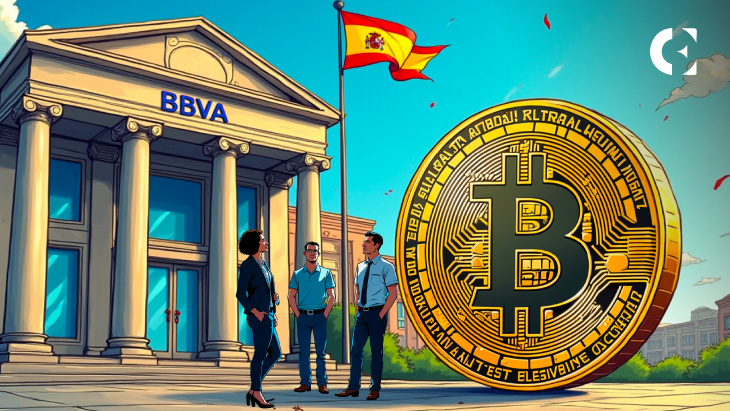- BBVA recommends wealthy clients invest 3-7% of their portfolio in cryptocurrencies.
- Despite EU regulators’ warnings, BBVA has been active in crypto markets since 2021.
- Spanish banks, such as BBVA and Santander, are expanding into crypto amid growing demand.
BBVA, the second-largest bank in Spain, is encouraging its wealthy customers to invest some of their funds in a digital currency. The bank suggests holding 3-7% of their portfolio in crypto-assets such as Bitcoin. The decision was made as the bank attempts to attract more conventional investors to the emerging cryptocurrency market.
Philippe Meyer, the head of digital and blockchain solutions of BBVA Switzerland, affirmed the strategy. According to him, the bank began advising its clients regarding Bitcoin in September last year. This recommendation aligned with the broader efforts to encourage clients to diversify their portfolios by incorporating alternative assets.
3% Crypto Boosts Portfolio Performance
Meyer underlined that the results of crypto additions to portfolios were significant, even given minor investments. He commented that adding a combination of only 3% crypto to a diversified portfolio can be beneficial, and also dismissed the fear of taking risks. “If you look at a balanced portfolio, if you introduce 3%, you already boost the performance, at 3% you are not taking a huge risk.”
BBVA has also continued to invest in crypto, despite the caution of European regulators against the asset class. The regulators of the European Union, including the European Central Bank, have issued warnings against investing in cryptocurrencies.
The European Securities and Markets Authority (ESMA) has disclosed that 95% of EU banks do not engage in crypto activities. Conversely, BBVA has been present and active in the crypto universe since 2021.
BBVA Joins Crypto Push With Bitcoin, Ether Services
In March, BBVA’s crypto strategy reached a key milestone as Spain’s securities regulator approved the bank to offer trading services for Bitcoin and Ethereum. This authorization marks a significant step in BBVA’s efforts to integrate cryptocurrency into its financial offerings.
Other banks, such as Santander, are also entering the crypto market. Santander is even investigating the issuance of stablecoins, as it seeks to expand its reach to the issuance of dollar stablecoins and euro stablecoins. Banks are increasingly exploring crypto investments as digital currencies gain popularity.
Related: Senate Passes GENIUS Act 68-30 to Establish U.S. Leadership in Digital Asset Innovation
Disclaimer: The information presented in this article is for informational and educational purposes only. The article does not constitute financial advice or advice of any kind. Coin Edition is not responsible for any losses incurred as a result of the utilization of content, products, or services mentioned. Readers are advised to exercise caution before taking any action related to the company.







